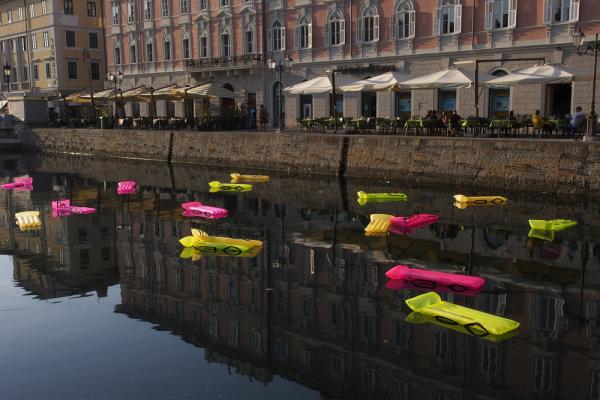SINCE JANUARY, more than 1,750 migrants have died or gone missing in the Mediterranean Sea. That is more than 30 times higher than during the same period last year, according to the International Organization for Migration. The United Nations estimated that, as of the end of May, 90,000 migrants had come across the Mediterranean into Europe so far in 2015.
Last summer, Christian Peacemaker Teams, an international NGO that places unarmed intervention teams in situations of conflict to reduce violence, launched CPT-Mediterranean on the Greek island of Lesbos to support migrants arriving by sea. I served with that team and heard survivors’ stories firsthand. So what is going on?
Eleven million people were displaced by violence last year, according to The New York Times, most driven out of Syria, Iraq, Ukraine, and Afghanistan. However, tens of thousands are also pushed north from sub-Saharan Africa, fleeing desperate poverty and violence. It’s the worst migration crisis since World War II, according to the United Nations.
In the past, most migrants into the European Union came by land. In Greece, they entered along the border with Turkey. In 2012, Greece built a fence along the Turkish border to stop migrants and refugees from coming into the country. This forced migrants to enter Europe along Greece’s border with Bulgaria. In 2014, a fence was erected there too, effectively cutting off a primary land route into the European Union. The only route left is across the Mediterranean Sea—monitored by the Greek coast guard.
I talked with many refugees who suffered harsh treatment at the hands of the Greek coast guard. One tactic currently in use is that of “push backs,” or collective expulsions. A young woman from Afghanistan, who had just arrived on Lesbos with her husband and 1-year-old son, told me her story. “We came in a small boat yesterday,” she said. “It was our second try. Two months ago we left Turkey in a bigger boat, with around 20 people on board, but after a while a military vessel approached and stopped us. The soldiers wore masks, pointed their guns at us, and kept shouting, ‘Who is the captain?’ They took our SIM-cards and threw them into the water. The men were separated from the women and children. Afterward, the men said they had been beaten and kicked. The soldiers destroyed the engine of the boat with an axe. We drifted for some hours until the Turkish police came and took us back to Turkey.” These collective expulsions are prohibited under Greek, European Union, and international law.
The current refugee crisis is a challenge for all the people of Europe. Many are responding at the grassroots level. In Germany, more than 200 Catholic and Protestant churches are offering sanctuary to refugees, according to the German Ecumenical Committee on Church Asylum. In Sweden, citizens have organized prayer vigils outside the Swedish Migration Board, responsible for deporting asylum seekers, and formed blockades outside the detention facilities to stop deportations with their bodies.
People in Greece and Italy are doing the most because they are on the front lines. In Mytilene, the capital and port city of Lesbos, volunteers have organized a welcome center, called the “Village of All Together,” at the site of a children’s camp. In summer 2014, the all-volunteer team provided for 600 refugees in a place that had only 80 beds.
Christian Peacemaker Teams will continue to support the work done to address the migrant and refugee crisis in the Mediterranean, with an emphasis on saving lives. As Thomas Albinson of the World Evangelical Alliance said, “As Christians, we need to avoid falling prey to those trying to manipulate public opinion by inciting fear. ... The truth is that the majority are seeking refuge from terrorists, violence, war, and persecution. They are the threatened ones.”

Got something to say about what you're reading? We value your feedback!
